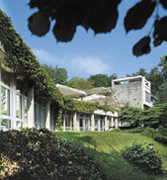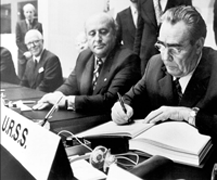At the Roots of the European Security System:
Thirty Years Since the Helsinki Final Act
International Conference in Rüschlikon/Switzerland
8-10 September 2005
|
||||
Draft Program, as of 30 August 2005 |
||||
Thursday, 8 September 2005: GDI Institute, Rüschlikon |
||||
| 8:45 | Opening remarks by | Andreas Wenger, Center for Security Studies, Zurich |
||
| Vojtech Mastny, Parallel History Project (PHP), Washington DC | ||||
| Malcolm Byrne, National Security Archive, Washington DC | ||||
| Max Guderzo, Machiavelli Center for Cold War Studies, Florence | ||||
| 9:00 | Introductory Keynote Speech by Adam D. Rotfeld , Foreign Minister of Poland | |||
Session 1: The Superpowers and European Détente |
||||
| 9:30 | Chair: Andreas Wenger, Center for Security Studies - “North America, Atlanticism, and the Helsinki Process,” Mike Morgan, Yale University - 'It Isn't Something I'm Proud Of': Henry Kissinger and the CSCE, 1969-74,” Jussi Hanhimäki , Graduate Institute of International Studies, Geneva - “Henry Kissinger and the Reconceptualization of European Security, 1969-75,” Jeremi Suri, University of Wisconsin, Madison
|
|||
| 11:30 | Chair: Malcolm Byrne, National Security Archive, Washington DC - “Soviet Power during the Helsinki Process 1965-75: Optimism, Doubt, or Defiance?” - “Soviet Interests, Expectations, and Reactions to the Signing of the Helsinki Final Act,” Svetlana Savranskaya, National Security Archive, George Washington University, Washington DC - "The Soviet Role in the Early CSCE Process,” Ambassador Yuri Kashlev, Ministry of Foreign Affairs, Moscow
|
|||
Session 2 : Eastern Strategies in the CSCE |
||||
| 14:30 | Chair: Vojtech Mastny, National Security Archive, Washington DC - “The Warsaw Pact and the Preparation for the European Security Conference, 1965-75,” Csaba Békés, Cold War History Research Center, Budapest - “East Berlin Targets in the Early CSCE Process: The GDR's Ultimate Effort to Make the Division of Germany Irreversible,” Federica Caciagli, University of Florence - “'Europe Must Not Become Greater Finland': The German CDU/CSU and China,” Bernd Schaefer, German Historical Institute, Washington, DC
|
|||
| 16:30 | Chair: Ambassador Rudolf V. Perina, Department of State, Washington DC - “Poland and the Origins of the European Security Conference, 1964-1969,” Douglas Selvage, Office of the Historian, Department of State, Washington, DC - “Polish Views on European Security and the CSCE,” Wanda Jarząbek, Polish Academy of Sciences - “Bulgaria, Balkan Diplomacy, and the Road to Helsinki,” Kostadin Grozev and Jordan Baev , Cold War Research Group Bulgaria, Sofia |
|||
Friday, 9 September 2005, GDI Institute, Rüschlikon |
||||
Session 3: West European Strategies in the CSCE |
||||
| 9:00 | Chair: Max Guderzo , University of Florence - “The Link between CSCE and MBFR: Two Sprouts from One Bulb,” Helga Haftendorn, - “The EC-Nine, CSCE, and the Changing Pattern of European Security,” Daniel Möckli, - “Beyond the Rhetoric: Interrogating the Narrative of 'Second Europe' and EEC Policy Coordination at the CSCE,” Ilaria Poggiolini
|
|||
| 11:00 | Chair: Leopoldo Nuti , University of Rome III - “The Preparation of the CSCE in the Light of the Trilateral Relationship between Paris, Bonn, and Moscow (1965-1973),” Sandy Roupioz, Institute of Political Studies (IEP), Paris - “Détente in Europe: An Italian Perception,” Ambassador Luigi Vittorio Ferraris, University of Rome III - “'It Was Cold War and We Wanted to Win': Human Rights, Détente, and CSCE as Seen Through Dutch Archives,” Floribert Baudet, University of Utrecht
|
|||
Session 4: The Neutrals and Non-Aligned in the CSCE Process |
||||
| 14:00 | Chair: Erwin Schmidl, Austrian Defence Academy, Vienna - “The Birth of N+NA: Swiss and Austrian Foreign Policy in the CSCE,” Thomas Fischer, Austrian Institute for International Affairs, Vienna - “What Role for a Small Neutral State in East-West Détente? New Perspectives on Switzerland's Role in the CSCE, 1969-75," Christian Nünlist, Center for Security Studies, Zurich - “Keeping Neutral between the Two German States: Finland's CSCE Initiative, 1969-73,”
|
|||
Session 5: Security, Trade, and Economics |
||||
| 16:00 | Chair: Alan Dobson , University of Dundee - “Forgotten in the Basket: The CSCE and the Rise and Fall of Economic Détente,” Juhana Aunesluoma, University of Helsinki - “Helsinki and Rambouillet: Security and Economic Matters at Stake, 1972-75,”
|
|||
| 19:00 | Concert of East-West Music, André Desponds (piano), GDI Institute | |||
Saturday, 10 September 2005, GDI Institute, Rüschlikon |
||||
Session 6: The German Question and the CSCE |
||||
| 9:00-11:15 | Chair: Klaus Larres , Royal Holloway, University of London - “An Intricate Web: Ostpolitik, the European Security System, and German Unification,"
|
|||
| 11:30 | Concluding Keynote speech: “The Helsinki Foundations of European Security: A Thirty-Year Perspective,” Vojtech Mastny , National Security Archive, Washington
|
|||
Session 7: Oral History Workshop |
||||
| 14:00 | Oral History Roundtable with Former Policy-makers and Diplomats Chair: Jeremi Suri |
|||
|
||||
Organized by the Center for Security Studies at ETH Zurich as a Partner in the Parallel History Project on NATO and the Warsaw Pact (PHP), in cooperation with the National Security Archive at George Washington University, and the Machiavelli Center for Cold War Studies , Florence. |
||||
|
||||



